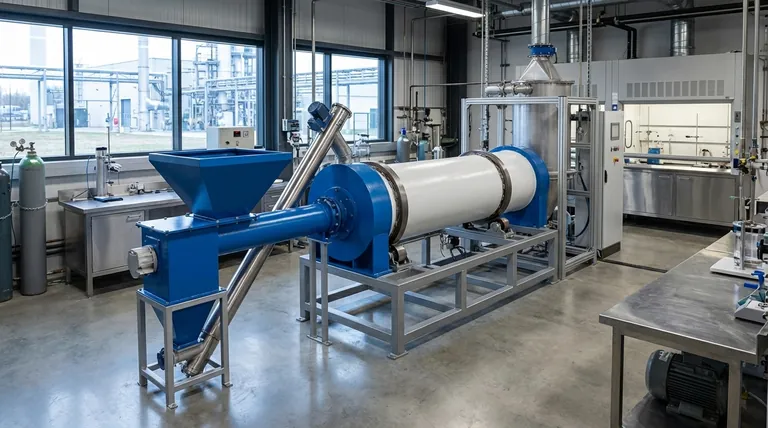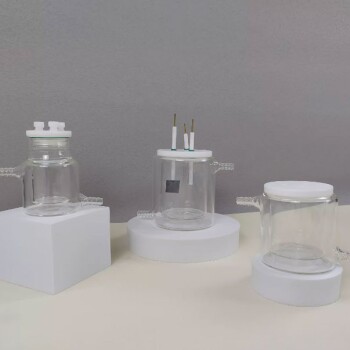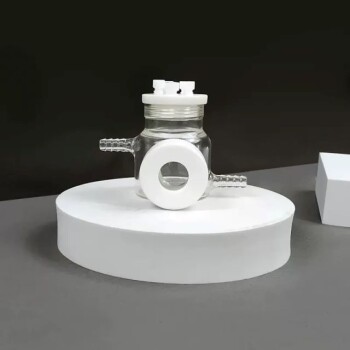Fast pyrolysis is a specialized thermochemical process designed to rapidly convert organic materials, such as biomass, into a liquid product known as bio-oil. By heating materials like wood or agricultural waste to high temperatures in an environment without oxygen, it breaks down their complex molecular structures into smaller, valuable components. This method is distinct from other thermal treatments because its primary goal is to maximize the yield of this liquid fuel.
The critical insight is that "fast" pyrolysis is not just about heat, but about the speed of that heat. By rapidly heating and then quickly cooling the material, the process essentially "freezes" the decomposition at the liquid stage, preventing it from breaking down further into gas and maximizing the bio-oil output.

How Fast Pyrolysis Works: The Core Principles
Fast pyrolysis is a highly controlled process engineered to achieve a specific outcome. Its success hinges on precise management of temperature, atmosphere, and time.
The Role of High Temperature
The process operates within a specific temperature range, typically 450-600°C. This heat provides the energy needed to break the strong chemical bonds within the organic feedstock, initiating its decomposition.
The Absence of Oxygen
This is the defining characteristic of any pyrolysis process. By performing the heating in an oxygen-free (or anaerobic) reactor, combustion is prevented. Instead of burning, the material undergoes a thermochemical separation into different molecules.
Rapid Heating and Short Residence Time
This is what makes the process "fast." The biomass particles are heated extremely quickly, and they remain in the hot reactor for a very short time, often less than two seconds. This rapid cycle is crucial for maximizing the production of liquid vapors.
Immediate Cooling (Quenching)
Once the hot vapors are created, they are immediately and rapidly cooled. This quenching process condenses the vapors into the dark, viscous liquid known as bio-oil or pyrolysis oil, which is the primary product.
The Three Primary Products
While the goal is liquid, fast pyrolysis creates three distinct outputs from the initial feedstock. The distribution of these products is what distinguishes it from slow pyrolysis, which favors bio-char.
Bio-oil (The Primary Yield)
This is the target product, often comprising up to 75% of the initial feedstock's weight. Bio-oil can be used as a renewable fuel for boilers or upgraded into higher-grade transportation fuels and specialty chemicals.
Bio-char (The Solid Residue)
A carbon-rich solid similar to charcoal, bio-char is the second product. It can be used as a solid fuel, an agricultural soil amendment to improve fertility, or as a feedstock for producing activated carbon.
Syngas (The Gaseous Byproduct)
The remaining fraction consists of non-condensable gases, often called synthesis gas or syngas. This gas mixture has fuel value and is typically recycled within the plant to provide the energy needed to heat the reactor, making the process more self-sustaining.
Understanding the Trade-offs and Challenges
While fast pyrolysis offers significant advantages, it is essential to understand its practical limitations. Objectivity requires acknowledging the challenges involved in its implementation.
Bio-oil Quality and Stability
Raw bio-oil is not a direct replacement for petroleum. It is typically acidic, contains significant water, and can be unstable, thickening over time. It almost always requires upgrading or refining before it can be used as a commercial fuel or chemical feedstock.
Feedstock Preparation
The process is sensitive to the physical properties of the feedstock. The material must typically be dried and ground into small particles to ensure the rapid heat transfer necessary for high liquid yields, adding an energy cost to the overall process.
Operational Complexity
While the concept is straightforward, maintaining the precise control of temperature, pressure, and residence time at a commercial scale requires sophisticated engineering. Reactors, such as ablative pyrolysis reactors, have been developed to manage these conditions effectively, but they still represent a technical challenge.
Making the Right Choice for Your Goal
The decision to use fast pyrolysis depends entirely on your end objective. The technology's main strength lies in its ability to convert low-density solid biomass into a high-density, transportable liquid.
- If your primary focus is producing renewable liquid fuels: Fast pyrolysis offers the most direct thermal route to convert solid biomass into a liquid energy carrier that can be stored and transported.
- If your primary focus is decentralized waste processing: The technology's potential for relatively small, mobile units makes it suitable for converting agricultural or forestry residues at their source, reducing transportation costs.
- If your primary focus is creating a value-added chemical feedstock: The resulting bio-oil contains a complex mixture of valuable organic compounds that can be separated and refined for use in other chemical industries.
Ultimately, fast pyrolysis provides a powerful and flexible tool for transforming low-value organic materials into higher-value liquid products.
Summary Table:
| Aspect | Key Detail |
|---|---|
| Primary Goal | Maximize yield of liquid bio-oil |
| Temperature Range | 450-600°C |
| Residence Time | Very short (often < 2 seconds) |
| Key Products | Bio-oil (primary), Bio-char, Syngas |
| Key Requirement | Oxygen-free environment |
Ready to transform your biomass into valuable bio-oil?
KINTEK specializes in advanced lab equipment and consumables for pyrolysis research and development. Our reliable solutions help you optimize your process, from feedstock preparation to product analysis.
Contact our experts today to discuss how we can support your renewable energy or waste valorization project with the right equipment for your laboratory's needs.
Visual Guide

Related Products
- Electric Rotary Kiln Small Rotary Furnace Biomass Pyrolysis Plant
- Customizable High Pressure Reactors for Advanced Scientific and Industrial Applications
- High Pressure Laboratory Autoclave Reactor for Hydrothermal Synthesis
- Mini SS High Pressure Autoclave Reactor for Laboratory Use
- 1200℃ Split Tube Furnace with Quartz Tube Laboratory Tubular Furnace
People Also Ask
- What advantages does torrefaction equipment offer for processing digestate? Unlock High-Value Energy Recovery
- What temperature can graphite withstand? Unlocking Its Extreme Heat Potential
- What is the standard for Aluminium heat treatment? Master the Temper Designation System for Optimal Properties
- What is the pulsed DC sputtering technique? A Stable Method for Depositing Insulating Films
- What is the difference between an industrial furnace and a laboratory electric furnace? Choose the Right Heating System
- What are the advantages and limitations of heat treatment? Tailor Material Properties for Peak Performance
- What are the limitations and disadvantages of powder metallurgy? Understanding the Trade-Offs for Your Application
- What can physical Vapour deposition be used for? Enhance Durability and Performance with PVD Coatings



















